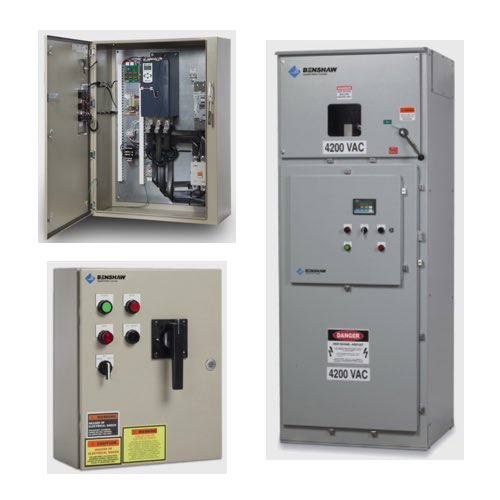Benshaw Soft Starters

Benshaw soft starters provide basic motor protection and control for a broad range of industrial applications. Unlike traditional motor starters, Benshaw soft starters use solid-state electronics to control the amount of power delivered to the motor at startup. They are ideal for applications where the motor has to start quickly but also need to be shut down in a controlled manner, with no power surge that might damage the motor or connected machinery. Adjustable settings for overload protection are an important feature of these starters and the set up is quick for easy commissioning.
Benshaw soft starters are intended for heavy-duty applications. They include advanced control technologies that are up to the task of handling consistent high-demand performance. They incorporate an integral bypass system that knocks down the heat generation that is typically associated with soft starting. Starting and stopping will be as smooth as they need to be without disrupting anything else or straining the soft starters. Benshaw soft starters are available for immediate shipment and include Benshaw's exclusive three year warranty.
FAQs
Do Benshaw standard duty open chassis soft starters feature adjustable overload settings and an integral bypass contactor?
Yes, Benshaw standard duty open chassis soft starters feature adjustable overload settings and an integral bypass contactor for enhanced motor protection and efficient soft start performance.
What is the motor load and line voltage of the severe duty Benshaw Inc soft starter?
The motor load and line voltage of the severe duty Benshaw Inc soft starter depend on the specific model and application requirements, as these soft starters are designed to handle high-performance motor control while ensuring reliable operation in demanding environments.
Motor Starters, Soft Starters and VFDs
Motor Starters
Motor starters safely start and stop a motor in industrial applications. They are designed with a contactor, overload and circuit protection. They are used when basic motor control is required, where torque on the motor is not a concern and speed control is not needed. The advantages of motor starters include: lower cost, allows for remote operation, allows for monitoring of motor state (with the use of auxiliary contacts) and they are safe and efficient. The disadvantages include: high inrush current that can cause fuses to blow and breakers to trip if the inrush is too high, and the starter will allow a full torque to start the motor which can cause the motor to ramp up to full speed very quickly potentially causing the motor to wear and degrade prematurely.
Soft Starters
Soft starters protect motors from inrush current by gently ramping up the motor to full speed. They provide all of the same functions as a traditional motor starter. The advantages of soft starters include: they are less expensive than a VFD when only startup control is needed, they are a smaller system than a VFD where space is a concern and they prevent unwanted torque upon startup, prolonging the life of the motor. The disadvantages include: they are more expensive than a traditional motor starter and they do not allow for full speed control.
VFDs
Variable Frequency Drives (VFDs) allow for the slow ramp up of a motor during startup and the slowing down of the motor during shutdown. They also allow for full speed control during the entire run cycle of the motor. VFDs provide the same functions as both the traditional motor starters and soft starters. The advantages of VFDs include: full speed control (start, stop and in-between), more custom control and monitoring, energy savings due to efficient motor usage and less wear and tear on the motors. The disadvantages include: they are more expensive and larger than other motor control options and they generate heat that may require fans or AC units.

